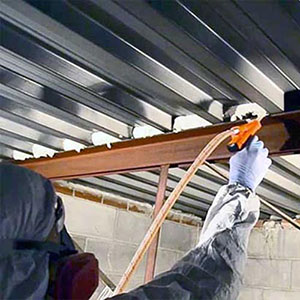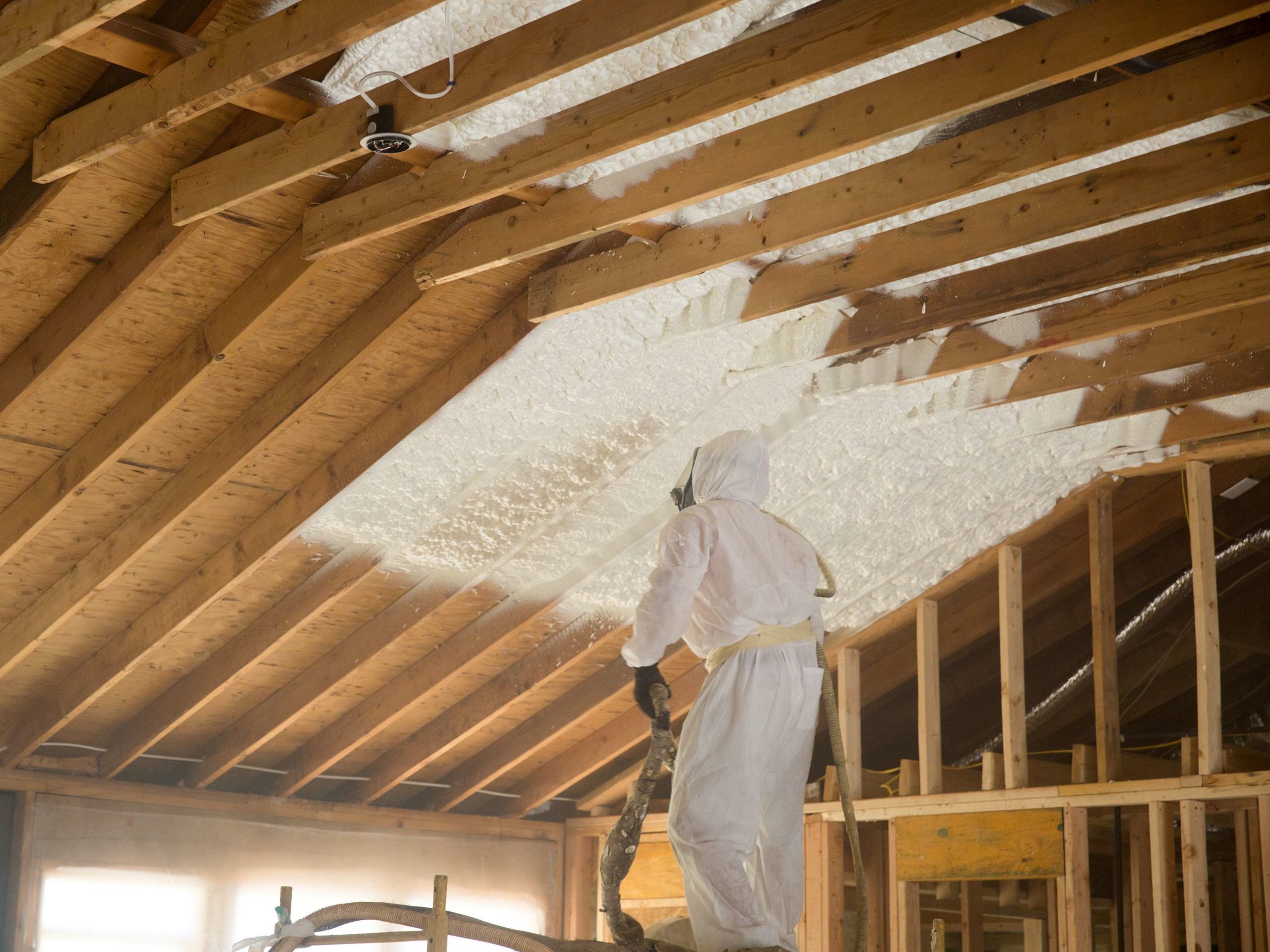Comparing Spray Foam to Traditional Insulation: Which Is Much better?
Comparing Spray Foam to Traditional Insulation: Which Is Much better?
Blog Article
Spray Foam: The Ultimate Remedy for Air Sealing and Insulation
Spray foam insulation has actually emerged as a leading solution for effective air sealing and thermal insulation, providing an one-of-a-kind combination of homes that establish it aside from traditional techniques. Its capacity to broaden and load spaces makes it particularly effective in preventing air leak, which can significantly impact power efficiency. Comprehending the complete range of its advantages, setup procedures, and comparisons with other insulation types is important for making notified decisions. As we check out these elements, the ramifications for both new buildings and retrofits become increasingly significant. What factors should influence your choice?
What Is Spray Foam?
Spray foam is a versatile insulation material that incorporates the concepts of air securing and thermal resistance to enhance energy efficiency in structures. Made up mainly of polyurethane or other comparable compounds, spray foam is used as a fluid that expands upon call with surfaces, producing a solid, continual layer of insulation. This distinct residential property enables it to fill voids, cracks, and gaps that standard insulation materials might neglect, giving a remarkable air seal.
There are two major sorts of spray foam: open-cell and closed-cell. Open-cell spray foam is lighter and extra versatile, offering exceptional sound absorption and a reduced R-value per inch - Spray Foam. On the other hand, closed-cell spray foam is denser, supplying a higher R-value, wetness resistance, and included structural honesty to building parts
The application process commonly includes customized tools, guaranteeing a smooth application that adheres to different substratums, including concrete, wood, and steel. This flexibility makes spray foam suitable for both brand-new building and constructions and retrofitting existing structures. Its capability to develop an airtight barrier significantly adds to minimizing power consumption and enhancing interior air quality, consequently making it a favored selection amongst contractors and house owners alike.
Benefits of Spray Foam Insulation
One of the most considerable benefits of spray foam insulation is its exceptional ability to produce a constant air barrier, which successfully decreases power loss. Unlike typical insulation products, spray foam increases to fill gaps and cracks, guaranteeing that air leakage is considerably minimized. This particular not only boosts power efficiency but additionally brings about lower energy bills in time.
Additionally, spray foam insulation offers exceptional thermal resistance, adding to an extra secure indoor setting. Its high R-value per inch permits for reliable insulation in restricted areas, making it optimal for attics, walls, and crawl rooms. In addition, the moisture-resistant homes of spray foam help prevent mold and mildew and mold growth, advertising much healthier living conditions.
An additional important benefit of spray foam insulation is its sound-dampening qualities (Spray Foam). It properly minimizes noise transmission in between rooms, developing a quieter and much more comfy home atmosphere. The resilience of spray foam additionally stands apart, as it does not droop or work out with time, preserving its efficiency throughout its lifespan
Just How Spray Foam Works
Recognizing how spray foam insulation functions is essential for valuing its performance in air sealing and thermal resistance. Spray foam insulation is composed of two main parts: isocyanate and polyol resin. When these elements are combined, they undergo a chain reaction that causes the material to broaden rapidly, producing a thick foam that loads cracks, spaces, and dental caries.
As the foam expands, it follows surface areas, creating an impermeable seal that significantly decreases air seepage. This particular makes spray foam insulation very effective at avoiding drafts and wetness infiltration, which can bring about power loss and damage over time. Furthermore, the closed-cell variation of spray foam provides premium thermal resistance as a result of its inflexible structure, effectively reducing heat transfer.
The unique homes of spray foam enable it to satisfy uneven surface areas, making sure thorough insurance coverage and a smooth obstacle. Consequently, spray foam insulation not only enhances energy efficiency but additionally adds to boosted interior air high quality by minimizing the build-up of allergens and pollutants. Inevitably, recognizing the auto mechanics behind spray foam highlights its function as a remarkable choice for insulation and air securing in both property and industrial applications.
Installment Refine Overview

Prior to installment, the space needs to be adequately cleaned up and prepped, making certain that surfaces are devoid of moisture, dirt, and particles. This step is vital due to the fact that contaminants can compromise bond and general efficiency. As soon as the location is prepared, the application entails blending both components of the spray foam, which expands upon contact and fills spaces efficiently.
Trained experts must carry out the setup, using specific devices to make sure consistent protection and ideal density. Security safety measures, consisting of using safety gear and making sure correct air flow, are critical during this process. After application, the foam generally cures rapidly, creating a solid obstacle that boosts power effectiveness.
Contrasting Spray Foam to Conventional Insulation
When evaluating insulation alternatives, spray foam insulation attracts attention in contrast to standard products such as fiberglass and cellulose. Among the key benefits of spray foam is its exceptional air securing abilities. Unlike fiberglass and cellulose, which can allow air seepage, spray foam broadens upon application, filling crevices and voids to produce an airtight seal. This results in enhanced power effectiveness, as much less warmed or cooled air runs away the home, causing lower energy bills.
Furthermore, spray foam offers a greater R-value per inch than conventional insulation kinds, providing even more effective thermal resistance in a thinner account. This characteristic is especially beneficial in rooms with limited tooth cavity deepness. Spray foam is resistant to wetness and mold and mildew growth, which can be a considerable problem with cellulose and fiberglass, particularly in damp settings.
However, spray foam insulation normally carries a higher in advance price than its traditional counterparts. Home owners must weigh this preliminary financial investment versus long-term energy cost savings and efficiency advantages. Inevitably, while both insulation types serve their purpose, spray foam emerges as an advanced remedy for modern-day his comment is here insulation needs, particularly in terms of air sealing and thermal effectiveness.

Final Thought
In summary, spray foam insulation represents an extremely effective service for achieving optimal air securing and thermal resistance. Its unique homes, including wetness resistance and noise dampening, make it suitable for various applications in both brand-new building and constructions and retrofitting tasks (Spray Foam). The initial prices might be higher contrasted to standard insulation materials, the lasting benefits, such as considerable energy financial savings and enhanced indoor air top quality, justify the financial investment and highlight its value in modern-day building techniques.
Spray foam insulation has arised as a leading option for effective air securing and thermal insulation, offering an one-of-a-kind combination of residential or commercial properties that establish it apart from conventional approaches.Spray foam is a flexible insulation product that integrates the concepts of air sealing and thermal resistance to boost energy effectiveness in buildings.When examining insulation options, spray foam insulation stands out in comparison to typical materials such as fiberglass and cellulose. Inevitably, while both insulation types serve their objective, spray foam emerges as a much more innovative service for modern-day insulation needs, especially in terms of air securing and thermal efficiency.
In summary, spray foam insulation stands for a highly efficient option for achieving ideal air securing and browse around here thermal resistance.
Report this page